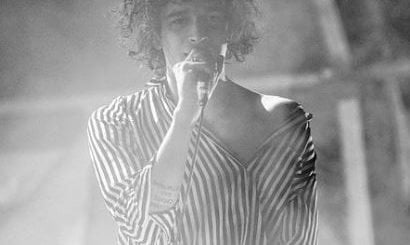M.O.N.E.Y. by The 1975 Lyrics Meaning – A Deep Dive into Consumerism and Modern Identity
- Music Video
- Lyrics
-
Song Meaning
- The Hedonistic Labyrinth: Debating the Song’s Overt Theme
- Decoding the Dollars: The Song’s Hidden Critique of Capitalism
- Facade, Frivolity, and Freedom: Anthropomorphizing the Modern Struggle
- Memorable Lines and Their Larger Implications
- The Visceral Voice of a Generation: Understanding The 1975’s Impact
Lyrics
You know he likes to get blown
Has he got enough money to spend?
Leave? No, he’s to and fro
He doesn’t like it when the girls go
Has he got enough money to spend?
It’s going off ’cause they’re not
Gonna let him in two and a half
The boy is rushing out his skin
He’s got his charm with the
Girls that are smoking he takes her arm
Jumps the bar and now he’s in
Drink slow to feed the nose
You know he likes to get blown
Has he got enough money to spend?
Leave? No, he’s to and fro
He doesn’t like it when the girls go
Has he got enough money to spend?
A broken half a glass has opened up his chin
He thinks he’s hard
A powdered mouth that tastes of gin
He’s just been barred for that
Blues he was smoking and then he barks
“It’s my car I’m sleeping in”
Tabs with unlimited O’s
New clothes, bloody nose
Powders and walking back home
Has he got enough weed? No
Broken phone, retching on the floor alone
And I can’t believe that
We’re talking ’bout him
“I’m searching you, mate
Your jaw’s all over the place”
Can’t talk, quick slap in the face
Yes, I threw a nut, but your friend’s a case
Why you singling him out
Is it because of his race?
“Look, the dog won’t bark if
You don’t lark about”
M-O-N-E-Y’s me m-O-N-E-Y
M-O-N-E-Y’s me m-O-N-E-Y
M-O-N-E – m-O-N-E –
M-O-N-E-Y m-O-N-E-Y’s me
M-O-N-E-Y
On the surface, The 1975’s track ‘M.O.N.E.Y.’ reads like a party anthem gone wrong, a night out narrated through a haze of indulgence and the acrid bite of cocaine. But Matty Healy, known for his lyrics that drip with societal observations, is painting a picture far more complex than revelry.
With a soundscape that carries the ethereal quality of The 1975’s signature synth-pop blend, ‘M.O.N.E.Y.’ unfolds as a critique of consumer culture, a story of the loneliness in hedonism and a scrappy struggle with identity in a world where self-worth is often gauged by material success.
The Hedonistic Labyrinth: Debating the Song’s Overt Theme
The track embodies the hedonistic lifestyle prevalent amongst youth culture, where the boons of material success—money, drugs, sex—are a navigational compass. But it’s not a didactic warning against such indulgences; it’s an exposé devoid of judgment, highlighting a dependency on these ephemera for self-validation.
Inherent in every line is a character lost between wants and needs, where the ability to spend becomes a proxy for life’s control. The 1975 masterfully places us in the shoes of someone who finds themselves trapped within this labyrinth but doesn’t necessarily want to leave, delving into the confusing dynamic of desire and destruction.
Decoding the Dollars: The Song’s Hidden Critique of Capitalism
Tucked beneath tales of substance abuse and nightlife escapades is a scathing critique of capitalism. Money, the beating heart of the song, doesn’t just buy pleasure—it’s a gateway to acceptance within society, a necessary vice to keep up with the ever-pulsing beat of consumerism.
The song’s protagonist is a slave to the cycle of spending, both socially and psychologically. Each verse a testament to the lengths one would go to attain the cultural currency needed to survive the night: the chase, the fall, and the isolation inevitable when the party ends.
Facade, Frivolity, and Freedom: Anthropomorphizing the Modern Struggle
M.O.N.E.Y. becomes a character itself, an anthropomorphic embodiment of pressure and pretense. It’s not just currency, it’s a status, a ticket to the theater of modern social rituals where roles are played, scripts written by unwritten societal norms.
The frantic pace of the song matches the relentless pursuit of an identity shaped and validated by material success, further emphasized by the song’s repetition and quick-fire delivery of lines. Freedom in this world comes at the cost of indulgence—yet is distortedly masqueraded as personal liberty.
Memorable Lines and Their Larger Implications
Phrases like ‘Tabs with unlimited O’s / New clothes, bloody nose’ pulsate with irony. They paint a grotesque picture where overindulgence inevitably leads to a destructive physical and mental state, despite the shiny veneer of new clothes and the social mobility they promise.
Equally, ‘broken phone, retching on the floor alone’ transforms from simply painting a picture of excess into a metaphor for disconnection and solitude. As the protagonist’s phone is broken—so is their link to the world and, perhaps, their true self, leaving them physically and spiritually isolated.
The Visceral Voice of a Generation: Understanding The 1975’s Impact
Undeniably, The 1975 have tapped into the vein of a generation that measures life in likes, wealth, and self-worth in consumption. ‘M.O.N.E.Y.’ is a significant articulation of this era’s beautifully dark side, showing how the band’s work frequently extends beyond music into social commentary.
As listeners resonate with the raw undercurrents of the song’s narrative, it becomes clear that The 1975 is not merely voicing their own thoughts but echoing the silent screams of those entrenched in this perfectly imperfect modern condition.








